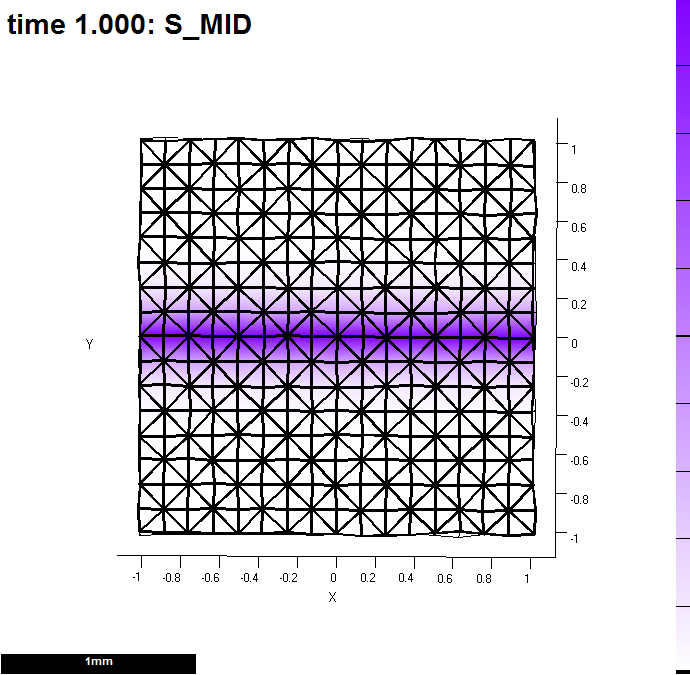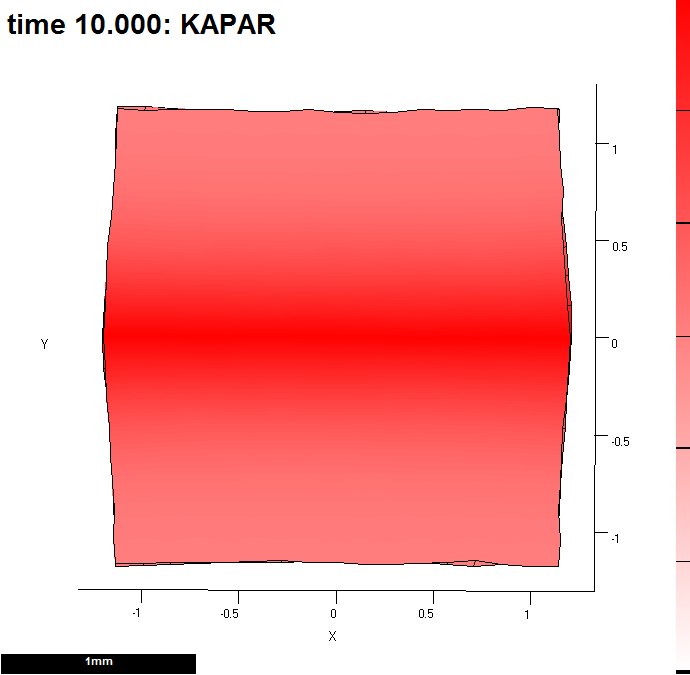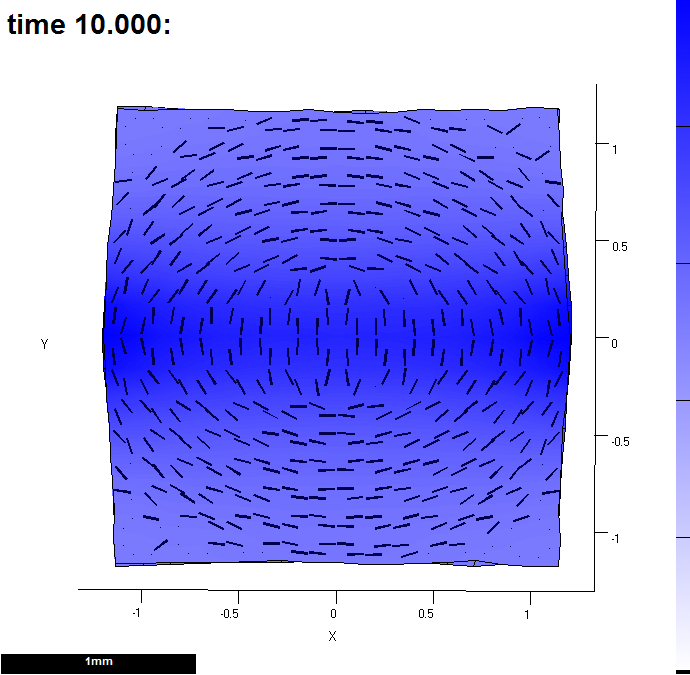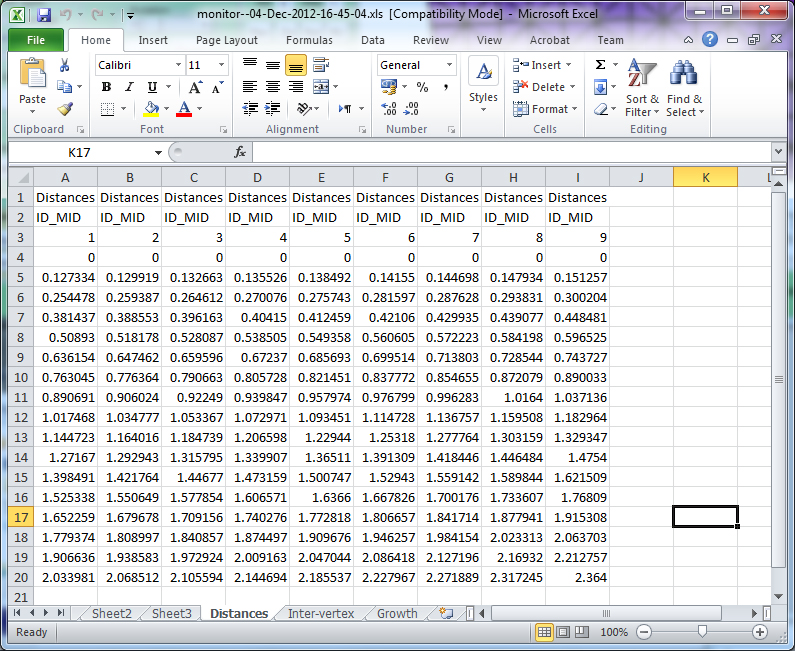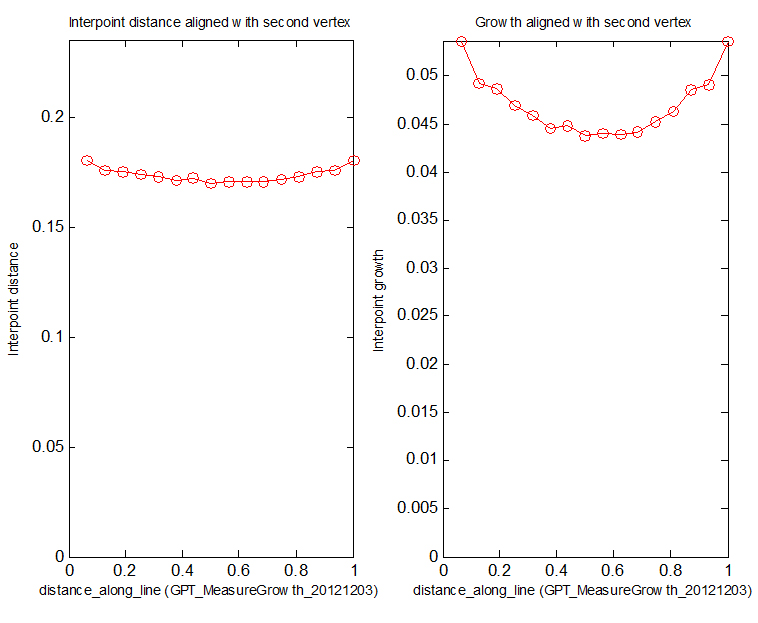Measuring using interaction function subroutines: Difference between revisions
No edit summary |
No edit summary |
||
| Line 28: | Line 28: | ||
Image:GPT MeasureGrowth 20121203-000001-0001.png |(A) A single row of vertices (id_mid) labels a line along which measurements will be made. Here, it provides a source for s_mid. | Image:GPT MeasureGrowth 20121203-000001-0001.png |(A) A single row of vertices (id_mid) labels a line along which measurements will be made. Here, it provides a source for s_mid. | ||
Image:GPT MeasureGrowth 20121203-000010-0003.png |(B) Kapar is promoted by s_a. Here, after 10 steps. We are going to view growth along id_mid. | Image:GPT MeasureGrowth 20121203-000010-0003.png |(B) Kapar is promoted by s_a. Here, after 10 steps. We are going to view growth along id_mid. | ||
Image:GPT MeasureGrowth 20121203-000010-0002.png|(C) It has been through the interaction function | Image:GPT MeasureGrowth 20121203-000010-0002.png|(C) It has been through the interaction function 10 times. This shows the growth by the time it has reached the end of the 10th pass. Colour shows growth rate over the last time step and lines indicate the major axis. The measurements were computed using '''leaf_computeGrowthFromDisplacements'''(). This display was created by the '''leaf_plotoptions''' function also in the interaction function (see red highlights below) | ||
Image:SpreadsheetGFtboxleaf profile monitor.jpg|(D) '''leaf_profile_monitor''' creates an Excel preadsheet showing distances along the line each time the system went through the interaction function. In the sheet shown, Line 3 displays the time each column was created. | Image:SpreadsheetGFtboxleaf profile monitor.jpg|(D) '''leaf_profile_monitor''' creates an Excel preadsheet showing distances along the line each time the system went through the interaction function. So this actually refers to growth after step 9 - it will go on to compute growth consequent upon this pass. In the sheet shown (the spreadsheet has several), Line 3 displays the time each column was created. Columns (lines 4 to 19) shows the distances of each vertex along i_mid. The spreadsheet is saved to the project snapshots directory. | ||
Image:Interpoint_distances_and_growth.jpg|(E) '''leaf_profile_monitor''' also creates Figures monitoring specified variables. Here the left panel: distances between successive vertices along id_mid. Right panel: growth at each vertex along id_mid. | Image:Interpoint_distances_and_growth.jpg|(E) '''leaf_profile_monitor''' also creates Figures monitoring specified variables. Here the left panel: distances between successive vertices along id_mid. Right panel: growth at each vertex along id_mid. | ||
</gallery> | </gallery> | ||
<br><br> | <br><br> | ||
Latest revision as of 10:44, 6 December 2012
Measuring growth of a model
Download a project illustrating measurements GPT_MeasureGrowth_20121203
The GPT_MeasureGrowth_20121203 interaction function is shown at the bottom of this page.
There are several ways to measure growth on the model. For example, there are two auxiliary functions:
[out1, out2, out3, out4] = leaf_computeGrowthFromDisplacements( m, displacements, time, ... ) Compute the growth rate in each FE of m given the displacements of all the prism nodes and the time over which these displacements happened. This assumes that m is in the state after these displacements have happened. The results returned depend on the options and on how many output arguments are given. Note that unlike most leaf_* commands, m itself is not one of the output arguments, since this procedure does not need to modify m.
function m=leaf_profile_monitor(m,realtime,RegionLabels,Morphogens,start_figno)
monitor morphogen levels at a set of vertices
m, mesh
RegionLabels, vertices to be monitored as designated by cell array of strings, i.e. region labels
Morphogens, cell array of strings, i.e. uppercase morphogen names to
be monitored. There should be one RegionLabels string for each
Morphogens string
Vertlabels, if true then display vertex numbers in each region label on
the mesh default false
start_figno, default figure 1 (Must open a fig even if just monitoring to file)
MonData, optional output of data structure
- Measuring growth
(C) It has been through the interaction function 10 times. This shows the growth by the time it has reached the end of the 10th pass. Colour shows growth rate over the last time step and lines indicate the major axis. The measurements were computed using leaf_computeGrowthFromDisplacements(). This display was created by the leaf_plotoptions function also in the interaction function (see red highlights below)
(D) leaf_profile_monitor creates an Excel preadsheet showing distances along the line each time the system went through the interaction function. So this actually refers to growth after step 9 - it will go on to compute growth consequent upon this pass. In the sheet shown (the spreadsheet has several), Line 3 displays the time each column was created. Columns (lines 4 to 19) shows the distances of each vertex along i_mid. The spreadsheet is saved to the project snapshots directory.
function m = gpt_measuregrowth_20121203( m ) %m = gpt_measuregrowth_20121203( m ) % Morphogen interaction function. % Written at 2012-12-04 15:01:27. % GFtbox revision 4418, . % The user may edit any part of this function between delimiters % of the form "USER CODE..." and "END OF USER CODE...". The % delimiters themselves must not be moved, edited, deleted, or added. if isempty(m), return; end fprintf( 1, '%s found in %s\n', mfilename(), which(mfilename()) ); try m = local_setproperties( m ); catch end realtime = m.globalDynamicProps.currenttime; %%% USER CODE: INITIALISATION %%% END OF USER CODE: INITIALISATION %%% SECTION 1: ACCESSING MORPHOGENS AND TIME. %%% AUTOMATICALLY GENERATED CODE: DO NOT EDIT. if isempty(m), return; end setGlobals(); global gNEW_KA_PAR gNEW_KA_PER gNEW_KB_PAR gNEW_KB_PER global gNEW_K_NOR gNEW_POLARISER gNEW_STRAINRET gNEW_ARREST dt = m.globalProps.timestep; polariser_i = gNEW_POLARISER; P = m.morphogens(:,polariser_i); [kapar_i,kapar_p,kapar_a,kapar_l] = getMgenLevels( m, 'KAPAR' ); [kaper_i,kaper_p,kaper_a,kaper_l] = getMgenLevels( m, 'KAPER' ); [kbpar_i,kbpar_p,kbpar_a,kbpar_l] = getMgenLevels( m, 'KBPAR' ); [kbper_i,kbper_p,kbper_a,kbper_l] = getMgenLevels( m, 'KBPER' ); [knor_i,knor_p,knor_a,knor_l] = getMgenLevels( m, 'KNOR' ); [strainret_i,strainret_p,strainret_a,strainret_l] = getMgenLevels( m, 'STRAINRET' ); [arrest_i,arrest_p,arrest_a,arrest_l] = getMgenLevels( m, 'ARREST' ); [id_mid_i,id_mid_p,id_mid_a,id_mid_l] = getMgenLevels( m, 'ID_MID' ); [s_mid_i,s_mid_p,s_mid_a,s_mid_l] = getMgenLevels( m, 'S_MID' ); % Mesh type: rectangle % base: 0 % centre: 0 % randomness: 0.1 % version: 1 % xdivs: 16 % xwidth: 2 % ydivs: 16 % ywidth: 2 % Morphogen Diffusion Decay Dilution Mutant % -------------------------------------------------- % KAPAR ---- ---- ---- ---- % KAPER ---- ---- ---- ---- % KBPAR ---- ---- ---- ---- % KBPER ---- ---- ---- ---- % KNOR ---- ---- ---- ---- % POLARISER ---- ---- ---- ---- % STRAINRET ---- ---- ---- ---- % ARREST ---- ---- ---- ---- % ID_MID ---- ---- ---- ---- % S_MID 0.01 ---- ---- ---- %%% USER CODE: MORPHOGEN INTERACTIONS if (Steps(m)==0) && m.globalDynamicProps.doinit % Initialisation code. % assign a morphogen down the middle of the y axis id_mid_p((m.nodes(:,2)<0.1)&(m.nodes(:,2)>-0.1))=1; s_mid_p(:)=0; s_mid_p=id_mid_p; m.morphogenclamp( (id_mid_p==1), s_mid_i ) = 1; m = leaf_mgen_conductivity( m, 's_mid', 0.01 ); %specifies the diffusion rate of polariser m = leaf_mgen_absorption( m, 's_mid', 0.0 ); % specifies degradation rate of polariser end kapar_p=15 * pro(1,s_mid_p); kbpar_p=15 * pro(1,s_mid_p); kaper_p=10 * pro(1,s_mid_p); kbper_p=10 * pro(1,s_mid_p); knor_p =0; % calculate growth over dt interval if isfield(m.userdata,'oldpos') displacements = m.prismnodes - m.userdata.oldpos; [growth,gf] = leaf_computeGrowthFromDisplacements( m, displacements, ... realtime - m.userdata.starttime,'axisorder', 'maxminnor', ... 'anisotropythreshold', 0.05); % plot resultant areal growth rates over dt (i.e. one step). m = leaf_plotoptions( m, 'pervertex',perFEtoperVertex(m,sum(growth(:,1:2),2)) ,'perelementaxes', gf(:,1,:), 'drawtensoraxes', true ); % monitor properties of vertices must be done here - so that it reports newly equilibrated levels end m.userdata.oldpos = m.prismnodes; m.userdata.starttime = realtime; % monitor growth in a Figure and write excel file [m,MonData]=leaf_profile_monitor(m,... % essential 'REGIONLABELS',{'ID_MID'},... % essential 'VERTLABELS',false,'FigNum',1,'EXCEL',true); % optional (file in snapshots directory') % if sum(ismember(output,realtime)) && m.userdata.output ==1 % % Output - plot an image at high resolution % path = fileparts(which(m.globalProps.modelname)); % [m,ok] = leaf_snapshot( m,[path,filesep,'snapshots',filesep,modelname,'_',modeltype,'.png'], 'resolution',[]); % % % end %%% END OF USER CODE: MORPHOGEN INTERACTIONS %%% SECTION 3: INSTALLING MODIFIED VALUES BACK INTO MESH STRUCTURE %%% AUTOMATICALLY GENERATED CODE: DO NOT EDIT. m.morphogens(:,polariser_i) = P; m.morphogens(:,kapar_i) = kapar_p; m.morphogens(:,kaper_i) = kaper_p; m.morphogens(:,kbpar_i) = kbpar_p; m.morphogens(:,kbper_i) = kbper_p; m.morphogens(:,knor_i) = knor_p; m.morphogens(:,strainret_i) = strainret_p; m.morphogens(:,arrest_i) = arrest_p; m.morphogens(:,id_mid_i) = id_mid_p; m.morphogens(:,s_mid_i) = s_mid_p; %%% USER CODE: FINALISATION %%% END OF USER CODE: FINALISATION end
